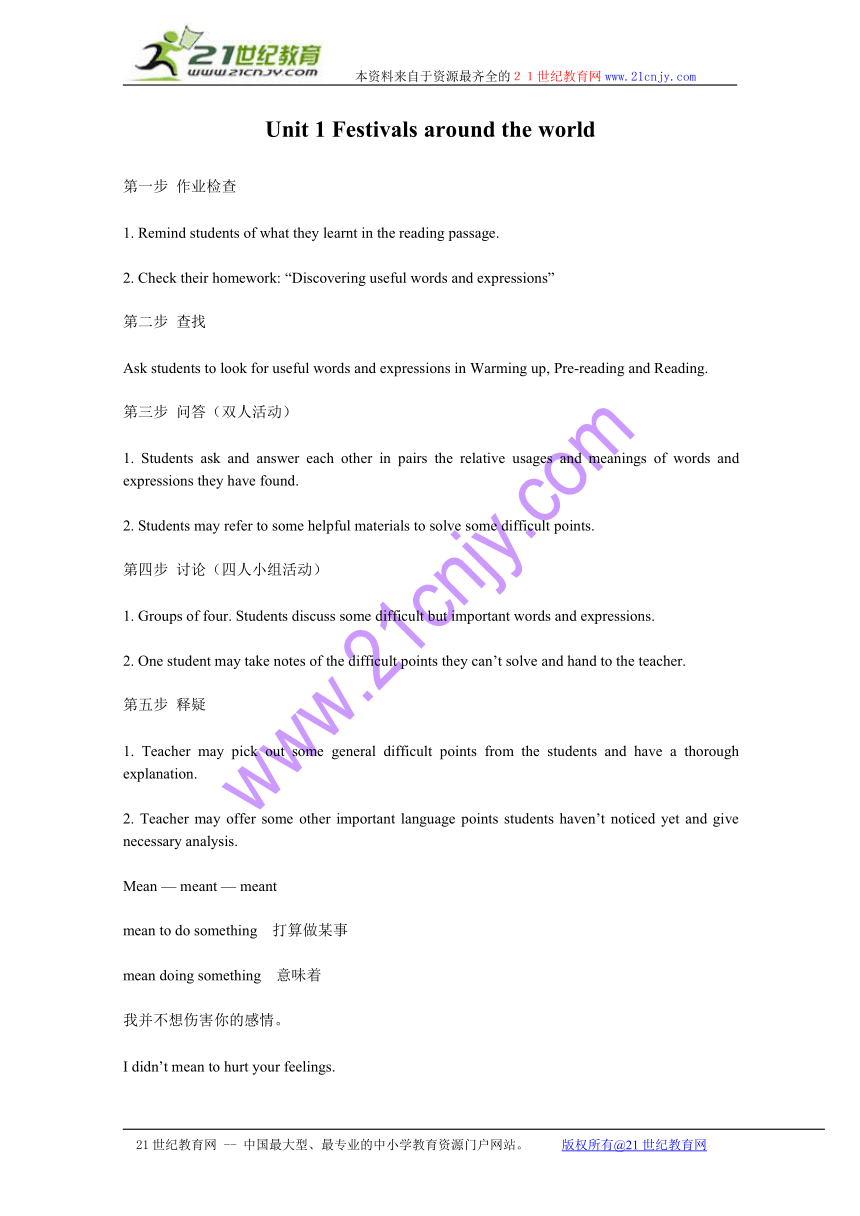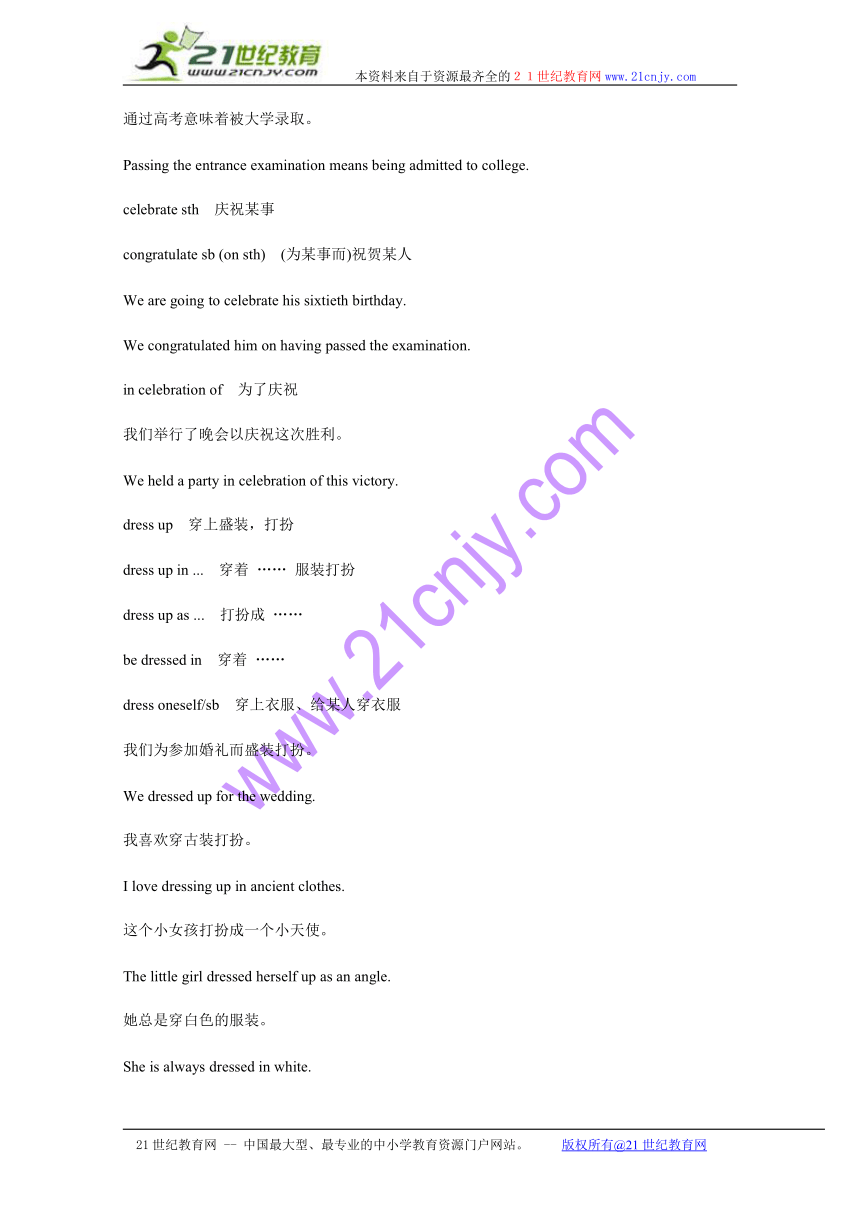unit 1 festivals around the world 教案 vocabulary(新人教版必修3)
文档属性
| 名称 | unit 1 festivals around the world 教案 vocabulary(新人教版必修3) |  | |
| 格式 | rar | ||
| 文件大小 | 12.9KB | ||
| 资源类型 | 教案 | ||
| 版本资源 | 人教版(新课程标准) | ||
| 科目 | 英语 | ||
| 更新时间 | 2009-07-07 19:42:00 | ||
图片预览


文档简介
本资料来自于资源最齐全的21世纪教育网www.21cnjy.com
Unit 1 Festivals around the world
第一步 作业检查
1. Remind students of what they learnt in the reading passage.
2. Check their homework: “Discovering useful words and expressions”
第二步 查找
Ask students to look for useful words and expressions in Warming up, Pre-reading and Reading.
第三步 问答(双人活动)
1. Students ask and answer each other in pairs the relative usages and meanings of words and expressions they have found.
2. Students may refer to some helpful materials to solve some difficult points.
第四步 讨论(四人小组活动)
1. Groups of four. Students discuss some difficult but important words and expressions.
2. One student may take notes of the difficult points they can’t solve and hand to the teacher.
第五步 释疑
1. Teacher may pick out some general difficult points from the students and have a thorough explanation.
2. Teacher may offer some other important language points students haven’t noticed yet and give necessary analysis.
Mean — meant — meant
mean to do something 打算做某事
mean doing something 意味着
我并不想伤害你的感情。
I didn’t mean to hurt your feelings.
通过高考意味着被大学录取。
Passing the entrance examination means being admitted to college.
celebrate sth 庆祝某事
congratulate sb (on sth) (为某事而)祝贺某人
We are going to celebrate his sixtieth birthday.
We congratulated him on having passed the examination.
in celebration of 为了庆祝
我们举行了晚会以庆祝这次胜利。
We held a party in celebration of this victory.
dress up 穿上盛装,打扮
dress up in ... 穿着 …… 服装打扮
dress up as ... 打扮成 ……
be dressed in 穿着 ……
dress oneself/sb 穿上衣服、给某人穿衣服
我们为参加婚礼而盛装打扮。
We dressed up for the wedding.
我喜欢穿古装打扮。
I love dressing up in ancient clothes.
这个小女孩打扮成一个小天使。
The little girl dressed herself up as an angle.
她总是穿白色的服装。
She is always dressed in white.
她每天早上都给她的孩子穿衣服。
She dresses her children every morning.
她匆忙地穿上衣服就出去了。
She dressed herself quickly and went out.
take place “发生,举行”事先计划或预想到的
happen “发生,碰巧”强调偶然性
break out (战争,灾害,疾病)爆发
共同点:均为不及物动词,无被动语态
Fill in the blanks:
1. The First World War _________ in 1914. (broke out)
2. A terrible accident _________ last night. (happened)
3. When will our school sports meet ________ (take place)
4. I _________ to be on the spot when they quarrel. (happened)
would 意为“过去常常”,表示过去的习惯性动作,不表示状态
used to既可表示过去的习惯动作,又可表示过去持续的状态或情况
I used to/would swim in the river when I was a child, but that was the past.
He used to/would come to my house for help when he had any trouble.
He used to be a worker.
daily
1) adj. = everyday 每天的,日常的
daily life 日常生活
2) adv. = every day 每日地
他按天领工资。
He gets paid daily.
3) n. 日报
中国日报 China Daily
人民日报 The People’s Daily
第六步 应用
1. Finish WB Exercise 1 & 2 on page 42.
2. Complete the following short passage choosing the right form of the given words and expressions.
take place, celebrate, look forward to, in memory of, daily, have fun with, national, arrival
Chinese National Day takes place on October 1st. We celebrate it in memory of the foundation of PRC after a long period of war. People look forward to its arrival because they can have a long holiday so that they forget for several days the boring daily life and have fun with their family or friends.
第七步 作业布置
1. Page 42 Exercise 3.
2. Students try to make up a short passage or a dialogue using as many new words and expressions as they can learnt today.
21世纪教育网 -- 中国最大型、最专业的中小学教育资源门户网站。 版权所有@21世纪教育网
Unit 1 Festivals around the world
第一步 作业检查
1. Remind students of what they learnt in the reading passage.
2. Check their homework: “Discovering useful words and expressions”
第二步 查找
Ask students to look for useful words and expressions in Warming up, Pre-reading and Reading.
第三步 问答(双人活动)
1. Students ask and answer each other in pairs the relative usages and meanings of words and expressions they have found.
2. Students may refer to some helpful materials to solve some difficult points.
第四步 讨论(四人小组活动)
1. Groups of four. Students discuss some difficult but important words and expressions.
2. One student may take notes of the difficult points they can’t solve and hand to the teacher.
第五步 释疑
1. Teacher may pick out some general difficult points from the students and have a thorough explanation.
2. Teacher may offer some other important language points students haven’t noticed yet and give necessary analysis.
Mean — meant — meant
mean to do something 打算做某事
mean doing something 意味着
我并不想伤害你的感情。
I didn’t mean to hurt your feelings.
通过高考意味着被大学录取。
Passing the entrance examination means being admitted to college.
celebrate sth 庆祝某事
congratulate sb (on sth) (为某事而)祝贺某人
We are going to celebrate his sixtieth birthday.
We congratulated him on having passed the examination.
in celebration of 为了庆祝
我们举行了晚会以庆祝这次胜利。
We held a party in celebration of this victory.
dress up 穿上盛装,打扮
dress up in ... 穿着 …… 服装打扮
dress up as ... 打扮成 ……
be dressed in 穿着 ……
dress oneself/sb 穿上衣服、给某人穿衣服
我们为参加婚礼而盛装打扮。
We dressed up for the wedding.
我喜欢穿古装打扮。
I love dressing up in ancient clothes.
这个小女孩打扮成一个小天使。
The little girl dressed herself up as an angle.
她总是穿白色的服装。
She is always dressed in white.
她每天早上都给她的孩子穿衣服。
She dresses her children every morning.
她匆忙地穿上衣服就出去了。
She dressed herself quickly and went out.
take place “发生,举行”事先计划或预想到的
happen “发生,碰巧”强调偶然性
break out (战争,灾害,疾病)爆发
共同点:均为不及物动词,无被动语态
Fill in the blanks:
1. The First World War _________ in 1914. (broke out)
2. A terrible accident _________ last night. (happened)
3. When will our school sports meet ________ (take place)
4. I _________ to be on the spot when they quarrel. (happened)
would 意为“过去常常”,表示过去的习惯性动作,不表示状态
used to既可表示过去的习惯动作,又可表示过去持续的状态或情况
I used to/would swim in the river when I was a child, but that was the past.
He used to/would come to my house for help when he had any trouble.
He used to be a worker.
daily
1) adj. = everyday 每天的,日常的
daily life 日常生活
2) adv. = every day 每日地
他按天领工资。
He gets paid daily.
3) n. 日报
中国日报 China Daily
人民日报 The People’s Daily
第六步 应用
1. Finish WB Exercise 1 & 2 on page 42.
2. Complete the following short passage choosing the right form of the given words and expressions.
take place, celebrate, look forward to, in memory of, daily, have fun with, national, arrival
Chinese National Day takes place on October 1st. We celebrate it in memory of the foundation of PRC after a long period of war. People look forward to its arrival because they can have a long holiday so that they forget for several days the boring daily life and have fun with their family or friends.
第七步 作业布置
1. Page 42 Exercise 3.
2. Students try to make up a short passage or a dialogue using as many new words and expressions as they can learnt today.
21世纪教育网 -- 中国最大型、最专业的中小学教育资源门户网站。 版权所有@21世纪教育网
同课章节目录
